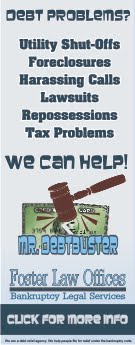Oct. 21 (Source: By Paul Gores, Milwaukee Journal Sentinel) - The pace of bankruptcy filings in Wisconsin has slowed this year — a welcome trend, but one that attorneys who deal with insolvent consumers and business people said won’t improve significantly until joblessness wanes.
Through the first nine months of 2011, federal bankruptcy filings were down 9.5% from the same time last year, to 21,167, U.S. Bankruptcy Court records show.
Most of those filings were for Chapter 7 bankruptcy, the type that wipes out debt such as credit card balances, utility bills and medical bills.
The state figures track closely with consumer bankruptcy filings nationally. Through the first three quarters in the United States, consumer filings decreased about 10%, to a little more than 1 million, the American Bankruptcy Institute reported.
Economist Jay Mueller said it makes sense that bankruptcies would start to decrease now because they lag the worst stress in the general economy, which occurred a couple of years ago.
ba
“I don’t think there is a lot to read into it other than to say there is a lag effect between a bad economy and bankruptcy filings,” Mueller, a portfolio manager for Wells Fargo Advantage Funds in Menomonee Falls, said of this year’s decrease.
Milwaukee bankruptcy attorney Robert Waud said he’s still seeing many people who have run their own business finally choose to throw in the towel. They often file for personal Chapter 7 bankruptcy.
“I’m busy. I’m seeing the same types of problems — the small-business person who doesn’t have any customers, and just a lot of people who are out of work,” said Waud, of Todd C. Esser & Associates.
Among recent bankruptcy filers at his office: cabinet makers for high-end homes and a repairer of hydraulics.
“Basically, what he did all his life was repair hydraulics on off-road machines for construction companies, and they just are not coming in the door,” Waud said.
Madison bankruptcy attorney Claire Ann Resop, of von Briesen & Roper, said she is seeing a lot of people who own small businesses that cater to minor luxuries instead of necessities, such as boutique clothing, furniture and flowers.
“I think the volume of business just doesn’t exist anymore,” she said.
Resop said the stigma of declaring bankruptcy seems to have lessened because in such a slow economy, so many have done it.
“I think the most stark change is businesspeople — higher-income people who were builders, developers, had their own business,” Resop said. “Because a lot of their acquaintances in the business, all of their professional friends, have also had to do it. They’re all in the same place. So I think they kind of look at each other and go, ‘Yeah, it’s the economy. It’s tough.’
Said Waud: “We’ve got to get people back to work before we can solve some of these problems.”
Read original article here.
Through the first nine months of 2011, federal bankruptcy filings were down 9.5% from the same time last year, to 21,167, U.S. Bankruptcy Court records show.
Most of those filings were for Chapter 7 bankruptcy, the type that wipes out debt such as credit card balances, utility bills and medical bills.
The state figures track closely with consumer bankruptcy filings nationally. Through the first three quarters in the United States, consumer filings decreased about 10%, to a little more than 1 million, the American Bankruptcy Institute reported.
Economist Jay Mueller said it makes sense that bankruptcies would start to decrease now because they lag the worst stress in the general economy, which occurred a couple of years ago.
ba
“I don’t think there is a lot to read into it other than to say there is a lag effect between a bad economy and bankruptcy filings,” Mueller, a portfolio manager for Wells Fargo Advantage Funds in Menomonee Falls, said of this year’s decrease.
Milwaukee bankruptcy attorney Robert Waud said he’s still seeing many people who have run their own business finally choose to throw in the towel. They often file for personal Chapter 7 bankruptcy.
“I’m busy. I’m seeing the same types of problems — the small-business person who doesn’t have any customers, and just a lot of people who are out of work,” said Waud, of Todd C. Esser & Associates.
Among recent bankruptcy filers at his office: cabinet makers for high-end homes and a repairer of hydraulics.
“Basically, what he did all his life was repair hydraulics on off-road machines for construction companies, and they just are not coming in the door,” Waud said.
“I think the volume of business just doesn’t exist anymore,” she said.
Resop said the stigma of declaring bankruptcy seems to have lessened because in such a slow economy, so many have done it.
“I think the most stark change is businesspeople — higher-income people who were builders, developers, had their own business,” Resop said. “Because a lot of their acquaintances in the business, all of their professional friends, have also had to do it. They’re all in the same place. So I think they kind of look at each other and go, ‘Yeah, it’s the economy. It’s tough.’
Said Waud: “We’ve got to get people back to work before we can solve some of these problems.”
Read original article here.

 12:19 AM
12:19 AM
 MrDebtBuster
MrDebtBuster
 Posted in
Posted in






